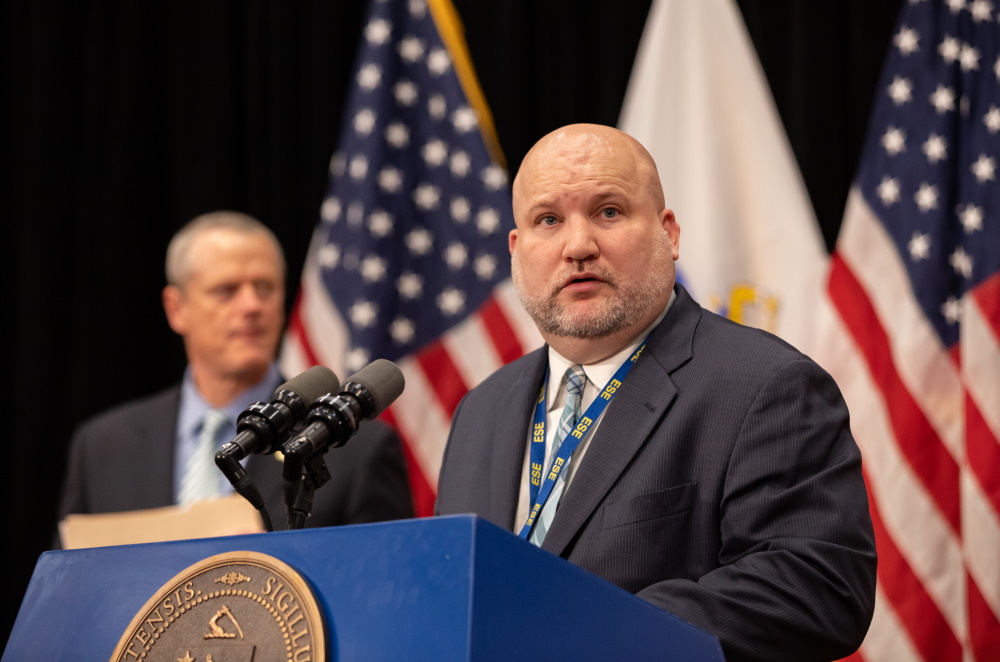MCAS testing requirements for the school year are suspended, the Department of Elementary and Secondary Education will modify or waive graduation requirements for students set to complete high school this summer, and due dates for district improvement plans will be pushed back under a bill Gov. Charlie Baker signed into law Friday.
Baker signed the bill one day after the legislature sent it to him, implementing immediate changes in school districts that have been closed by executive order since March 15. The new law also postpones the MBTA’s budget timeline and makes housing assistance benefits easier to acquire remotely.
“Cancelling MCAS testing for the remainder of this school year will enable our teachers and students to focus on learning and personal well-being as we continue to navigate the current public health emergency,” Sen. Jason Lewis, co-chair of the legislature’s Education Committee, said in a statement after the branches agreed to the bill Thursday. “Legislators heard loud and clear from teachers, parents and superintendents that this was the right thing to do.”
The new law requires Education Commissioner Jeff Riley to vacate the annual requirement for a standardized test in public schools amid disruptions caused by the coronavirus pandemic. The Department of Elementary and Secondary Education will also be instructed to modify or waive MCAS competency standards typically required to acquire a high school diploma.
The bill also grants districts breathing room on filing plans to close achievement gaps, which originally were due by April 1 under a seven-year, $1.5 billion education funding reform law signed last year. Language in the law Baker signed Friday sets the new deadline as May 15 while giving Riley authority to delay it again.
If schools are unable to approve fiscal year 2021 budgets by June 30 because of ongoing social distancing, they can implement stopgap monthly spending plans at one-twelfth the amount of the fiscal year 2020 budget, under the new law.
Baker’s current executive order requires all K-12 schools to remain closed through at least May 4, and while the governor has resisted keeping them shuttered through the end of the academic year, extensions are possible if public health risks continue.
The federal government allowed states to cancel testing requirements if they filed waivers, and at least 40 have done so, according to the Massachusetts Teachers Association.
“Once the governor ordered schools closed until at least May 4, it was obvious to educators and parents that Massachusetts should join the many other states that have already canceled their test-administration requirements this spring,” MTA President Merrie Najimy said shortly before Baker signed the bill.
Najimy reiterated past criticism of the MCAS system and said the pause “provides all of us with an opportunity to rethink the testing requirements.”
The new law also delays statutory budget dates for the MBTA, which has seen ridership drop more than 75 percent—and revenues fall by tens of millions of dollars per month — during the pandemic.
The Fiscal and Management Control Board now has until May 15 to approve a preliminary budget and until June 15 to submit a final spending plan to the MBTA Advisory Board, rather than March 15 and April 15, respectively.
Before the pandemic slammed Massachusetts, the focus had been on investing more money into the T to ensure its capacity to more efficiently move scores of travelers. For now, the debate around the T has changed.
MBTA officials plan to present more information about the fiscal year 2020 revenue impacts of the outbreak at a Monday meeting, most of which will be conducted remotely.
The new law also allows Massachusetts residents seeking housing assistance to acquire benefits without completing in-person verification in a state office, enabling people to avoid COVID-19 exposure risks.
Towns cannot terminate essential services offered to residents including water, electricity and trash collection for failure to pay taxes or fees due after Baker declared a state of emergency on March 10, so long as the constituent demonstrates a financial hardship stemming from the outbreak.
“This legislation helps a wide variety of entities deal with the effects of the COVID-19 pandemic,” House Ways and Means Committee Chair Rep. Aaron Michlewitz said. “Whether it’s aiding our cities and towns with the needs of their school districts, to helping homeless providers have greater flexibility in protecting those most in need, the legislature stands ready to help those most affected by this public health crisis.”
While lawmakers celebrated the bill’s passage in a joint press release featuring eight different legislators, Baker’s signature came with less fanfare.
“Signed it already, and thanked the legislature for getting it done,” Baker said at his daily coronavirus press briefing when asked about the bill.

